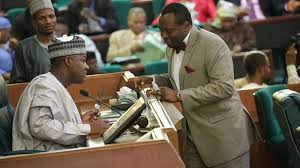Opinion
Kids Without Play Opportunities

“All work and no play”, its said, “makes Jack a dull boy.” Despite this age-long maxim that recognises the role of play in early childhood development, play appears to be eluding many Nigerian kids. The deprivation of play opportunities comes in different forms for the Nigerian child depending on family’s social setting or status, but the effect is much the same. For children in Nigerian poor families, life is becoming as much a hassle as it is for their struggling parents. Due to harsh economic conditions, many families resort to engaging their kids prematurely in trading activities especially in hawking, to help boost family revenues, when these kids should be enjoying leisure after school. Some of these children barely attend schools while being forced to spend much of their childhood hustling in the streets. For children from well-off families, time could be as crunchy as it is for their busy parents when, obsessed with setting agenda for the future of their kids, parents arrange stringent educational regiment too early for their kids.
These group of children are made to get-off the bed by 5.30am every weekday, get ready for private school buses that call at 6.00am, otherwise report by however means to school at 7.20am.The situation is worse for kids in the city of Lagos where the need to beat urban traffic rush-hours is very high. Most children are further subjected to extra hours of lessons after school at 2.00pm, only to be released with loads of homework. On many occasions children who leave home for school at 6.30am get back by 3.30pm. With hardly enough time to eat, do school assignments and take afternoon naps, these children hardly had time for plays before dinners. In Nigeria, kids of ages between 3 and 12 spend averages of 9 hours a day and 45 hours a week to and from schools, and additional hours doing home assignments and domestic jobs, whereas their peers in developed countries spend about half that duration and have more time for leisure.
Any remaining spare time left after school work or street hustle is further stolen, when kids who usually are fascinated by gadgets, are exposed to household electronics like phones, tablets and gaming consoles. Electronic games may create a sense of leisure, but the difference with human interactions is that kids doing games interface mostly with machines or with programme structured in ways that entrap a child’s pysch directionally, according to the game’s programming, in ways that may not encourage independent thinking. Moreso, attraction to such gadgets displaces kids’ attention from important television and radio programmes. The prevalent tight, academic schedules for some Nigerian kids, though intended for academic excellence, encroaches on childhood leisure time needed to achieve an all-round childhood development, and could make children to resent formal education altogether. Besides, academic excellence or economic pursuit, is not all there is to living a well-nurtured life.
Children’s leisure time, defined as time left over after sleeping, eating, personal hygiene and attending school or day-care, is very crucial to childhood development. Sociologists recommend that children should have at least 40 per ceny of the day as leisure. According to Berry Brazelton, a former pediatrician at Harvard Medical School, “Play is the most powerful way a child explores the world and learns about him or herself.” Unstructured play encourages independent thinking and allows the young to negotiate their relationships with their peers, and in the process build self-confidence and self-control. Play is one of the important ways in which young children gain essential knowledge and skills. Leisure time enhances learning as fun enables children to learn at their own level and pace. Young children naturally explore and learn many skills by making cognitive connections from events that catch their attention.
Unstructured plays help children developed their cognitive, physical and communication skills that make them acquire social qualities necessary in navigating relationships in adult life. Plays enable children assess how others feel and learn perspectives as well as empathy through observing differences in facial expressions, body language and even tone of voice, which helps them copy how to express themselves to others, and therefore develop socially acceptable behavours that build relationships. In cooperative activities, children willingly take things in turn and may delegate roles. Children can also share the glory of winnings through competitive games, which is all great for working together in task sharing. Aside encouraging parents to ensure adequate leisure time for their kids at home, schools should make plays and exercises an integral part of the educational curriculum. The educational curriculum set by the Nigerian Educational Research and Development Council (NERDC) includes specific training durations and break periods, as well as sporting activities, as part of the school system.
Due to poor government funding, sports in public schools have declined, while most private schools lack sporting infrastructure or even play grounds. These make recreational activities and sports implementation almost impossible in schools. Also, the increasing rate of urbanisation in Nigerian communities is gradually eroding ancient playgrounds, while established urban centres have lost community playgrounds. With tightening apartment spaces now being the norm in most urban residential areas, many kids are forced to wriggle within burglary-proof enclosures. Nigerian governments and the relevant agencies should ensure that existing child labour protection laws, educational and urban development codes are implemented in the country, to enable proper nurturing of children as the future stakeholders of our society. Private schools, especially, should be supervised to ensure they follow the educational curriculum standards set by NERDC.
In a bid to impress parents and draw more patronage as better option than public schools, private schools, most of whom operate in cramped environments, have continued to set high regiments of training schedules beyond the capacity of most kids, and even encourage enrollment of pre-school age kids who can not sit still to listen for an extended periods of time. Schools, from creche to secondary levels, without playgrounds and recreational facilities should not be allowed to operate, and should be made to understand and implement appropriate curriculum and training durations. Many Nigerian kids, whether from rich or poor families, appear to have been set-up inadvertently, in the same leisure denial that affects their parents. All work and no play could lead to some messed-up kids who grow up not understanding social cues, and being unemotional and self-centered, manifest later as obsessive-compulsive adults.
By: Joseph Nwankwo
Opinion
Congratulations Fubara, Joseph Of Rivers State

We thank God who is above all human contrivance and arrogance. Congratulations, Your Excellency Amaopusenibo Sir Siminalayi Joseph Fubara. Your victory takes us back to the Bible as a living document of a God that rules in the affairs of all His creation. In a manner of speaking, welcome back from your first war with Phillistines, Your Excellency! Yes, first example is David and Goliath! And like David, Your Excellency stands over Goliath in victory. But that is not enough. Our real enemy is that Your Excellency is Governor of a State with a wretched economy. Indigenes of Your State are today reduced to battalions of beggars waiting for who will hire their loyalty on the usual “pay-as-you-go” basis.
Your Excellency, it brings us to another Bible- based parallel. Conscientious Rivers indigenes above 50, should identify with and commit our all to this second parallel. It is to liberate the economy and people of Rivers people from 23 years enslavement and poverty, for us to regain our dignity and pride. When the economy of Egypt was drifting into a disaster zone, even Pharaoh did not know it. He also did not know what to do. But God sent a Joseph to build the economy into a fortress of good fortune that overcame the economic and social disaster Egypt did not know was ahead. Your Excellency for 23 years, Rivers State has been ruled without any logical, credible and consistent PLAN of how to overcome mass poverty from our dehydrated local economies.
Your Excellency, Rivers State cannot survive one month without Federal allocation! So called IGR only about 10 per cent of Federal allocation.It is also not based on what we produce but on tax from other people’s productivity that pass through our State. Pharaoh did not know what to do in the case of Egypt. May it please God to position another Joseph in Governor Siminalayi Joseph Fubara to heal Rivers State and build an economy that all Africa will come to access in order to chart a new course out of worsening economic hardship that is caused by near zero investment in productivity and endemic reckless looting. They are the twin chambers nursing a corporate cancer unfolding across Nigeria and Africa. The hard work begins today, Your Excellency.
We need an economic blueprint that will enrich every Rivers senatorial district from investment to grow productivity and to enrich every Rivers person from career-based productive labour, just as Pharaoh was enriched by Joseph’s economic Blueprint. Let Rivers State stop the trend of waiting the lives of young Rivers people recruited by Phillistines into cultism, thuggery and easy money, as a career. These Phillistines believe they have only lost one phase of many legal battles and battles by other means. But from comments in the public media, their eyes are fixed on 4-years of war and more! Your Excellency, we the people will not let you forget what you owe us. We have to make unbelievers see that your leadership is different and that we are uprooting the old order of an unproductive Feudal System. That system makes a few persons and their cronies to monopolise our collective wealth, while the majority are left in misery. Let’s put an end to enslavement by cabals and mass poverty in Rivers State. That is when the Phillistines will surrender.
By: Amaopusenibo Brown
Opinion
Reserved Seats for Women: A Step Forward
Opinion
Judicial Fraud And Land Grabbing

About six years ago, my client, a UK-based Nigerian widow, became the target of an audacious scheme orchestrated by a notorious syndicate of land grabbers operating under the guise of a land owning family in Ikeja, Lagos. Their objective was clear: to dispossess her of her rightful ownership of three plots of land situated behind the former Tasty Fried Chicken building on Opebi Road, Ikeja. In a disturbing abuse of judicial process, these individuals approached a Magistrate Court then at Ikeja Local Airport, and by misrepresentation and fraudulent manipulation, secured a writ of possession against my client. It appeared their strategy was anchored on the assumption that the rightful owner was deceased. However, unknown to them, my client was very much alive, she only passed on last year.
Following this fraudulent judgment, the land grabbers, aided by a lawyer with an infamous reputation in the Ikeja axis for such sharp practices, took swift and forceful possession of the land. They began advertising the property to prospective buyers, offering each plot for several millions of naira. Upon being alerted by my client’s tenants, I conducted a search and discovered that the defendants had surreptitiously instituted the action using one of their own as the purported adverse party, who did not contest possession. Realising the magnitude of the fraud, I promptly secured my client’s Certificate of Occupancy and filed an application for joinder and a motion to set aside the judgment, backed by robust documentary evidence and affidavits deposing to the true facts.
The defendants, in a desperate and laughable defence, relied on a purported judgment allegedly delivered in the 1920s, claiming global ownership of lands stretching from Ikeja to Agege. When pressed to produce a survey plan or other definitive means of delineating the land covered by such a judgment, they failed woefully. The supposed plan was neither attached nor frontloaded.Fortunately, the presiding Magistrate, a sharp, fearless, and principled judicial officer saw through the deception and set aside the judgment accordingly.
What followed was a calculated legal standoff. After some days passed, I anticipated that the defendants would file a notice of appeal along with a motion for stay of execution, I acted strategically: by 8:00 a.m. of that day, possession had been recovered, effectively foreclosing their efforts to frustrate justice. They served their notice of appeal and motion for stay by 9:00am as I had anticipated.
Predictably, they resorted to harassment by filing a spurious petition at the Lagos State Police Command, alleging trespass. When that failed, they escalated the matter to the Assistant Inspector General of Police at Zone 2, Onikan. However, following a comprehensive review of all court documents and the title records, the Assistant Commissioner of Police, an officer of commendable integrity, sternly warned the fraudulent parties and their counsel never to return with such frivolous claims. He also threatened legal consequences for presenting forged or misleading documents. Regrettably, such land-grabbing tactics are far from isolated. I am presently handling another similar matter at the High Court of Lagos State, Ikeja Judicial Division. In this case, a property owner based in Jos, who has been in undisturbed possession of his land since before the Nigerian Civil War, was excluded from a suit for possession. The Plaintiffs falsely claimed adverse possession and obtained judgment using a family member as a nominal defendant. This is a land that had been returned to the owner (my client) by the Lagos State Government post-war, after a temporary wartime acquisition.
That matter is ongoing, and we remain confident that justice will again prevail. These cases serve as stark reminders of how certain individuals exploit procedural loopholes, such as substituted service and fictitious defendants, to perpetrate judicial fraud. It is common practice for notices of service to be pasted at the premises at odd hours, quickly photographed, and removed before anyone notices, thereby fabricating compliance with due process. This modus operandi, if not checked, undermines the integrity of our justice system. It may very well explain the plight Mr. Peter Obi’s brother, whose reported dispossession, despite a valid Certificate of Occupancy and long-standing possession, calls for judicial scrutiny and legal redress. While the wheels of justice may turn slowly, they remain capable of grinding exceedingly fine, provided legal practitioners act with diligence, and judicial officers remain vigilant and impartial.
There is a compelling need to amend our procedural rules regarding the use of unnamed or unknown persons as defendants in land litigation. Courts, both at High Court and Magistrate level – should be mandated to conduct locus in quo inspections where defendants are purportedly unknown or where substituted service is claimed. Such reforms will deter fraudulent practices and restore public confidence in the judiciary.In conclusion, let it be reaffirmed: the Nigerian legal system, though imperfect, is still a formidable instrument for the protection of property rights when wielded with integrity, precision, and tenacity.
Ubani, is a legal practitioner and public affairs analyst, Legal Advisor of Assemblies of God, Nigeria.
By: Monday Onyekachi Ubani
-

 Business2 days ago
Business2 days agoCBN Comptroller Warns Against Naira Sale
-

 Business3 days ago
Business3 days agoReal Estate GDP Contribution Surges To N41.3tn
-

 Business3 days ago
Business3 days agoFreight Forwarders Raise Alarm Over Govt Reforms Sabotage
-

 Politics2 days ago
Politics2 days agoObasanjo, Tinubu Mourn Audu Ogbeh’s Death @78
-

 Maritime2 days ago
Maritime2 days agoMWUN, Police Parner In Safer Port Operations
-

 Politics2 days ago
Politics2 days ago2027: Nigerians Victims Of Desperate Politicians – Cleric
-

 Maritime2 days ago
Maritime2 days agoNSC Hails MARAN’s Effords At Developing Maritime Sector
-

 Business2 days ago
Business2 days agoFlight Distruption Looms, As Aviation Workers Prepare For Strike

